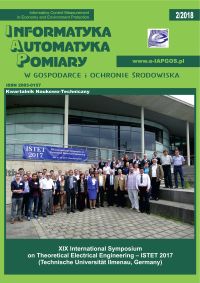Avrunin O. G., Tymkovych M. Y., Moskovko S. P., Romanyuk S. O., Kotyra A., Smailova S.: Using a priori data for segmentation anatomical structures of the brain. Przegląd Elektrotechniczny 93/2017, 102–105.
Bellon O. R., Silva L.: New improvements to range image segmentation by edge detection. IEEE Signal Processing Letters 9/2002, 43–45.
Bernstein M. A., King K. F., Xiadhong J. Z.: Handbook of MRI pulse sequences. Amsterdam. Elsevier, 2004.
Boskovitz V., Guterman H.: An adaptive neuro-fuzzy system for automatic image segmentation and edge detection. IEEE Transactions on Fuzzy Systems 10/2002, 247–262.
Hidayatullah R. R., Sigit R., Wasista S.: Segmentation of head CT-scan to calculate percentage of brain hemorrhage volume. Knowledge Creation and Intelligent Computing (IES-KCIC), IEEE, 2017, [DOI: 10.1109/KCIC.2017.8228603].
Kaganami H. G., Beiji Z.: Region-Based Segmentation versus Edge Detection. Intelligent Information Hiding and Multimedia Signal Processing IIH-MSP'09. Fifth International Conference, 2009.
Rebouças E. S., Braga A. M., Sarmento R. M.: Level Set Based on Brain Radiological Densities for Stroke Segmentation in CT Images. Computer-Based Medical Systems (CBMS), IEEE 2017 [DOI: 10.1109/CBMS.2017.172]
Sharma N., Aggarwal L. M.: Automated medical image segmentation techniques. J. Med. Phys. 35/2010, 3–14.
Suri J. S., Setarehdan S. K., Singh S.: Advanced Algorithmic Approaches to Medical Image Segmentation. Springer, 2002.
Tadeusiewicz R., Korohoda P.: Komputerowa analiza i przetwarzanie obrazów. Wydawnictwo Postępu Telekomunikacji, Kraków 1997.
Tadeusiewicz R., Śmietański J.: Pozyskiwanie obrazów medycznych oraz ich przetwarzanie, analiza, automatyczne rozpoznawanie i diagnostyczna interpretacja. Wydawnictwo Studenckiego Towarzystwa Naukowego, Kraków 2011.
Ulagamuthalvi V., Kulanthaivel G.: An novel approach for segmentation using brain images. International Conference on Control, Instrumentation, Communication and Computational Technologies (ICCICCT ), IEEE, 2017.
Wróbel Z., Koprowski R.: Praktyka przetwarzania obrazów z zadaniami w programie Matlab. Akademicka Oficyna Wydawnicza EXIT, Warszawa 2012.
Yahiaoui A. F. Z., Bessaid A.: Segmentation of ischemic stroke area from CT brain images, Signal, Image, Video and Communications (ISIVC), IEEE 2017 [DOI: 10.1109/ISIVC.2016.7893954].







